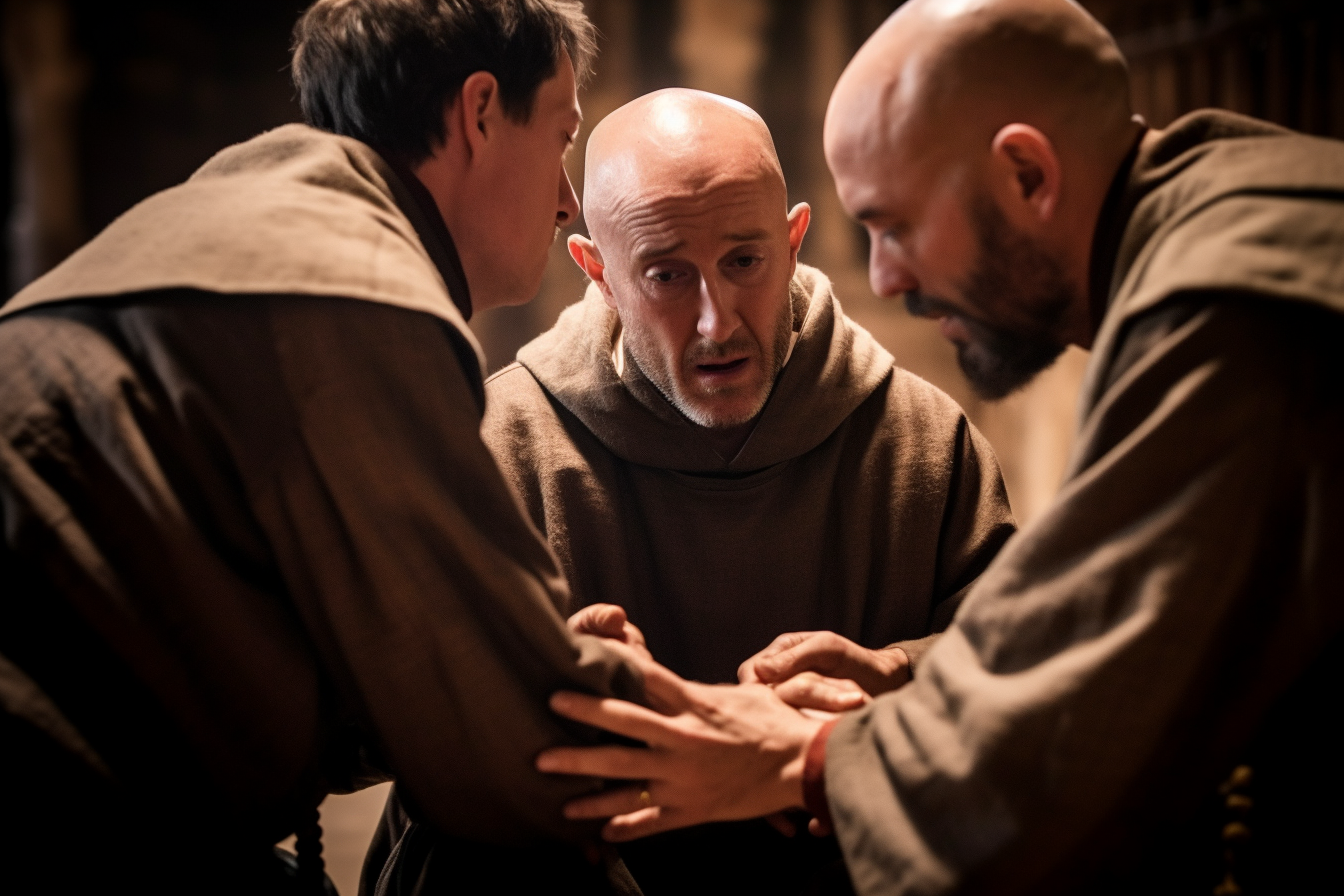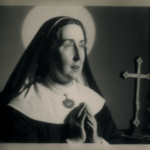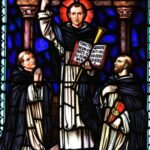
St. Bonaventure
St. Bonaventure
When He Lived
St. Bonaventure, also known as St. Bonaventura, was born in 1221 and passed away on July 15, 1274.
Where He Lived
St. Bonaventure was born in Bagnorea, a town in Italy. He spent a significant portion of his life in Paris, where he pursued his education and later became a prominent scholar and teacher.
Notable World Events
- The Seventh Crusade (1248-1254): This event saw King Louis IX of France lead a crusade to the Holy Land in an attempt to recapture Jerusalem. The crusade ultimately ended in failure and the capture of Louis IX.
- Mongol Empire’s Expansion (13th century): During St. Bonaventure’s lifetime, the Mongol Empire, led by figures like Genghis Khan and Kublai Khan, continued its expansion across Asia, the Middle East, and Eastern Europe.
- Founding of the University of Naples (1224): The University of Naples Federico II was founded during St. Bonaventure’s early years. This institution played a significant role in the development of medieval education and scholarship.
- Dante Alighieri’s Birth (1265): The famous Italian poet Dante Alighieri was born a few years before St. Bonaventure’s passing. Dante’s literary works, including “The Divine Comedy,” had a lasting impact on Western literature and culture.
- The Magna Carta (1215): Although a few years before St. Bonaventure’s birth, the Magna Carta’s signing marked a crucial milestone in the establishment of constitutional and legal principles, influencing later developments in governance and human rights.
- Development of Gothic Architecture: The construction of iconic Gothic cathedrals, such as Notre-Dame in Paris and Chartres Cathedral, was ongoing during St. Bonaventure’s lifetime. These architectural marvels represented advancements in engineering and artistic expression.
His Patronage
St. Bonaventure is renowned as the patron saint of theologians and scholars. He is often invoked by those seeking guidance and inspiration in their academic pursuits. His deep philosophical writings, particularly on the relationship between faith and reason, continue to influence scholars, philosophers, and theologians to this day.
The Early Life of St. Bonaventure
St. Bonaventure, whose real name was Giovanni Di Fidanza, was born in 1221in Bagnoregio. His father was Giovanni Di Fidanza, a physician, while his mother was Maria of Ritella. At his baptism, he was given the name John.
As a little boy, legend has it that St. Bonaventure fell ill, and his mother sought the intercession of St. Francis of Assisi for a cure. The legend further goes on to say that St. Francis saw a great future for the young John and at that point changed his name to Bonaventura (Italian) or Bonaventure (English), meaning bringer of good fortune.
The Priestly Life of St. Bonaventure
Joining the Franciscan order in 1243, St. Bonaventure studied at the University of Paris and obtained a Master of Arts degree. While in Paris, he became close friends with St. Thomas Aquinas and the Holy King, St. Louis.
While in the school of Theology, his masters saw him as a student who had a very keen memory and unusual intelligence, making him stand out amongst his fellow students.
During his priestly years, he was able to integrate his study of theology with the mode of Franciscan life. This he was able to accomplish simply by turning the pursuit of truth into a divine form of worship.
When it came to biblical teachings, St. Bonaventure started this mission earnestly in 1248. From 1251 to 1253, he was said to have lectured on a medieval theology textbook, The Sentences by Peter Lombard, an Italian theologian of the 12th century.
Bonaventure was known to have an uncanny ability to reconcile the diversity of traditions often encountered in philosophy and theology.
As a devout Franciscan, he defended the Franciscan ideal of Christianity against William of Saint-Amour, who wanted to prevent the Franciscans and their brother order, the Dominicans, from attaining positions. This occurred in the year 1256.
Due to his great love and defense of the Franciscan order as well as his personal ability to adhere to higher principles and ideals, he was elected as the 7th Minister General of the Franciscans on February 2, 1257.
Due to his ability to reconcile differences, he was able to end the discord in the Franciscan order between the two factions that had formed by placating and reproving as needed. This ability of his made Pope Gregory X appoint him the Cardinal Bishop of Albano, Italy, in May 1273.
At an earlier time, though, St. Bonaventure had declined an appointment to the See of York, England, from Pope Clement in 1265.
Being the leading figure in the reformation of the church at the second Council of Lyon, he was able to reconcile the secular church with the moderates in such a way that both sections of the church lived and accepted each other peacefully.

Due to the graceful way in which he preached the Bible, he was referred to as an eloquent preacher and easily won the hearts of those who came to know him.
Works of St. Bonaventure
The most popular work of St. Bonaventure to this day is His “Journey of the Mind to God”. A great masterpiece, it focuses on how man ought to meditatively contemplate the divine God through Christ. The life of St. Francis was the example upon which this work of his was based.
He was also able to recodify the constitutions of the Franciscan order (1260) and wrote for the order, “A New Life of St. Francis of He was also able to recodify the constitutions of the Franciscan order (1260) and wrote for the order, “A New Life of St. Francis of Assisi” (1263). In 1269, the order and the written work “A New Life of St. Francis of Assisi” were protected by St. Bonaventure from an assault by Gerard of Abbeville.
Between 1267 and 1273, St. Bonaventure was able to protect the church by ensuring that the Christian faith was upheld and the views of the unorthodox masters of Paris, which contrasted with the revelations in philosophy, were refuted.
Death and Canonization of St. Bonaventure
Sadly, St. Bonaventure died suddenly on July 15th, 1274, in very suspicious circumstances during the Ecumenical Council for which he had worked. Though the cause of his death remains uncertain, some have attributed it to a possible case of poisoning.
St. Bonaventure was canonized by the Franciscan Pope Sixtus IV in 1482, on April 14th precisely. Upon consideration of his works in the life of the church Another Franciscan Pope, Sixtus V, would later in the year 1588 declare St. Bonaventure Doctor of the Church.
5 Interesting Facts About St. Bonaventure
- His baptismal name was John, and the name Bonaventure was reportedly
given to him by St. Francis of Assisi, who, it was said, could see
into the future of people. - He was born into a prosperous family, as his father was a successful
doctor in his era. - The name Bonaventure, which stuck to him, means good fortune. It is a
beautiful name for young baby boys. - St. Bonaventure is the Patron Saint of bowel disorders. You can seek
his intercession whenever you have bowel problems. - He is referred to as the Seraphic Doctor of the Church. This came
about due to his sincere devotion to St. Francis and the Franciscan
way of life.
Prayer to St. Bonaventure
Pierce, O most sweet Lord Jesus, my inmost soul with the most joyous and healthy wound of Thy love and with true, calm, and most holy apostolic charity, that my soul may ever languish and melt with entire love and longing for Thee, may yearn for Thee and for thy courts, may long to be dissolved and to be with Thee. Grant that my soul may hunger after Thee, the Bread of Angels, the refreshment of holy souls, our daily and super substantial bread, having all sweetness and savor and every delightful taste.
May my heart ever hunger after and feed upon Thee, Whom the angels desire to look upon, and may my inmost soul be filled with the sweetness of Thy savor; may it ever thirst for Thee, the fountain of life, the fountain of wisdom and knowledge, the fountain of eternal light, the torrent of pleasure, the fullness of the house of God; may it ever compass Thee, seek Thee, find Thee, run to Thee, come up to Thee, meditate on Thee, speak of Thee, and do all for the praise and glory ofThy name, with humility and discretion, with love and delight, with ease and affection, with perseverance to the end; and be Thou alone ever my hope, my entire confidence, my riches, my delight, my pleasure, my joy, my rest and tranquility, my peace, my sweetness, my food, my refreshment, my refuge, my help, my wisdom, my portion, my possession ,my treasure; in Whom may my mind and my heart be ever fixed and firm and rooted immovably. Amen.



